- Home
- Keith R. A. DeCandido
The Art of the Impossible Page 10
The Art of the Impossible Read online
Page 10
Garrett grabbed his wrist before he could activate the damage-control system. Troi turned around. Vaughn had apparently been standing very close to where the charged particles had torn through the Hoplite hull and was now literally hanging on for life. Each of his hands gripped the ragged edges of the breach, and that tenuous hold was all that kept Elias Vaughn from a rather unpleasant death. Unfortunately, most of his body was outside the perimeter of the hull, so if Troi did activate the damage control systems, the force field would slice through Vaughn’s arms at the wrists and consign his handless body to a quick grave.
Of course, if Troi didn’t seal the breach, they’d all die in about a minute when the air was gone.
The shuttle carried very little excess material, and it was all secure, so there was, at least, little danger of something hitting Vaughn on its way to being blown into space. That still left them with minimal options.
Either him or Garrett unstrapping themselves to try to physically retrieve the lieutenant wasn’t possible, since that would most likely result in Vaughn’s would-be rescuer suffering the same fate.
Then he remembered the recent upgrades Starfleet had made to their shuttlecraft—including emergency transporters. Unfortunately, the controls were on one of the side consoles, a meter away.
However, the armbands that activated the transporters were in a cabinet just to the left of Troi’s feet. He reached down, the straps from his restraints biting into his ribs, and opened the cabinet. The armbands were programmed to transport whoever wore them to the center of the shuttle upon activation. They had a total of ten armbands, so if Vaughn wasn’t able to catch one, they had nine more chances. I just hope he figures out what I’m doing, he thought as he tossed one armband toward Vaughn.
“Toss” turned out to be an inaccurate verb, as all Troi had to do was let go of the armband after he took it out of the cabinet and it, like Vaughn and the air in the shuttle, followed the scientific law that molecules will tend toward an area of lesser pressure from an area of greater pressure.
Turning in his chair, his hand hovering over the control that would activate the force field, Troi watched as Vaughn abandoned fifty percent of his lifeline by releasing his right hand’s grip on the edge of the breach. He figured it out, Troi thought with relief. Vaughn’s bloody fingers managed to catch the strap of the armband. Using his fingers in manner impressively nimble given the copious amount of blood covering them, not to mention the intense rush of air plowing into his body, Vaughn managed to shift his grip to the metal circle in the center of the armband that contained the activation control.
He then dematerialized. As soon as the transporter effect took him away, Troi activated the damage control systems.
Four things happened in rapid succession. Troi’s chair rocked forward as the pull of the decompression ceased with the activation of the force field. The hull breach alarm also ceased, though the vibrating in Troi’s teeth did not. He heard the sound of a transporter in the shuttle, which placed Vaughn’s form upright in the center of the Hoplite, the armband still in the grip of his blood-covered fingers. And he heard the sounds of the environmental system laboring to restore the cabin’s lost atmosphere.
“Very well done, Mr. Troi,” Garrett said, unstrapping herself, then reaching down and grabbing the shuttle’s medikit. “Get us out of here before we have to do it again.” To Vaughn, she said, “Let me take a look at those hands, Lieutenant.”
They managed to get the rest of the way out of the nebula without incident, though the SIF was down to fifteen percent by the time they made it past the nebula’s edge. Vaughn’s hands were deemed adequately cared for until he could go to the Carthage sickbay, but that trip wasn’t immediately called for, at least.
“Set course back to the Carthage?” Troi asked, preparing to do that very thing.
“No.”
Troi shot his commanding officer—now back in the copilot’s seat—a look. “Sir?”
“I want to test a theory first.”
Vaughn, who now had Starfleet-issue bandages around his hands, and whose brown-and-gray hair was now flying in several directions, lending a comic air belied by the serious tone of voice he always had, leaned forward. “Commander, with all due respect, we need to return to the Carthage immediately. Captain Haden—and Ambassador Dax—need to be informed. So does Starfleet. We’re going to need reinforcements, and also—”
“Lieutenant, kindly sit back and shut up. You’re right, the Cardassians have decided to put a backup plan in place, hiding a fleet in the nebula. But think about it for a second. The Klingons may have a backup plan of their own, and they don’t need a nebula to hide in, they have cloaking technology.”
“So why’d they hide in the nebula before?” Troi asked.
Garrett shrugged. “Power consumption, maybe. Or they wanted to take advantage of their superior sensors in the vicinity of the nebula. Ultimately, it doesn’t matter. Mr. Troi, is there any way to scan for cloaked ships?”
Troi blew out a breath. “Not easily. Every time we come up with a way to penetrate a cloak, the Klingons or the Romulans come up with a better cloak.”
“Yes or no, Mr. Troi.”
“I’m sorry, Commander,” Troi said after a moment, hating himself for doing it, “but I can’t be that definitive.”
Garrett actually smiled at that. “Good man. I prefer an honest answer. Do an intensive scan of the vicinity, long-and short-range, tell me if anything screams ‘cloak’ at you.”
“I’ll do my best, sir.”
Troi spent the better part of an hour scanning the area. Garrett and Vaughn left him to it, for the most part, both going aft to get some ration packs. Garrett also did a check of all the shuttle’s systems, making sure that the Hoplite would survive to make it back to the Carthage in one piece—with, Troi heard her mention, specific emphasis on the environmental systems to make sure that the air they lost in the breach would be replenished.
The only interruption came when Vaughn walked over with a mug of tea. “Thanks,” Troi said as he took the steaming mug from Vaughn’s hands. He took a quick whiff, and identified it as the generic tea included in the packs. Pity, I could go for some raspberry herb tea right now. Still, Troi appreciated the gesture.
“I should be thanking you. You saved my life, Ian. It’s greatly appreciated.”
Troi smiled. “You’d have done the same for me.”
“Possibly, but I didn’t have to. You thought very quickly on your feet, and acted without hesitation. Pretty impressive. I just hope that Haden and Garrett appreciate what they’ve got.”
Troi grinned. “Me, too.” He took a sip of the tea, which was bitter, but still warm and comforting.
Then the sensor alarm sounded—a much milder sound than the hull breach alarm from earlier, indicating that the scan was complete.
Garrett apparently heard it from the aft section, as she came forward seconds later. “Report.”
Looking over the results of the scan, Troi shook his head. The final results told the same story that the preliminary findings had been telling him for the past hour. “Best I can give you is a definite maybe, Commander. We’re picking up subspace variances that could indicate a fleet of cloaked ships. But it could also be simple background radiation.”
“I’m willing to bet it’s the former,” Vaughn said. He looked at Garrett. “Neither the Empire nor the Cardassians have shown themselves to be adept at negotiation where force or guile will do the job nicely.”
“I tend to agree.” Garrett bit her lip. “All right, enough sightseeing. Mr. Troi, set a course for the Carthage. Tell them that we had to cut short our exploration of the nebula, and point to the hole in our rear if they ask why. We’ll give the captain and ambassador a full report on board.”
Troi nodded. “Yes, sir.”
Damn, but I wish I wasn’t right. This can’t possibly bode well.
Chapter 11
U.S.S. Carthage
In the quarters on the Carthage
assigned to Talen Kallar, an alarm went off. The alarm emanated from a small device implanted in the ear of the cabin’s occupant, so only he heard it. He barely hesitated in his assigned task of organizing files from the notes that had been taken during the most recent negotiating session. Kallar had a reputation as a physical bumbler, and was more likely to trip over his own feet than walk a straight line, but he was good at the dreary paperwork tasks that always fell upon interns. As a youth, and the lowest-ranking person in Legate Zarin’s delegation, Talen Kallar was assigned those duties.
However, the alarm was not intended for “Talen Kallar,” for the alarm heralded a signal from a device crafted by the organization that had created Talen Kallar. The name and background credited to Kallar in fact had been a fiction written by the Obsidian Order as a cover for one of their newest agents, a recent graduate of Bamarren named Corbin Entek.
While “Kallar” finished coding the latest file for Olett to look over, Entek made mental note of the fact that the alarm indicated that people had entered Captain Vance Haden’s ready room.
According to the ship’s chronometer, the next communications sweep would be in one minute. After that, Entek had a ten-minute window to activate the transmitter in the same device that had sent the alarm. The Carthage’s communications system did an automatic sweep for unauthorized transmissions every ten minutes.
To Entek, that was one of many reasons why he knew that Cardassia would eventually dominate the galaxy. If the Federation—arguably the greatest power in the quadrant—had such lax security on one of their military vessels, they would be ripe for the taking. There was no reason why those scans couldn’t be perpetual, leaving no window for such espionage as Entek was performing. Entek’s original theory, when he was told of this odd security measure, was that it was to conserve power. However, the very room in which he sat proved that to be a false assumption—the Carthage was a momument to wasted energy, from the overly large rooms to the availability of separate quarters for each member of two full negotiating teams.
The other proof of lax security was the very manner in which Entek had planted the device. The captain had ordered the first officer to give Legate Zarin and his staff a tour of the Carthage—as if they were vacationers visiting a museum! Entek had actually laughed in the human commander’s face when she said she was taking him on that tour, and only a quick conversion of that laugh to a hysterical giggle had enabled him to maintain his cover as a callow youth.
Of course, Entek’s supervisor, whose name Entek did not know, would have said that he was a callow youth, and he had only gotten this assignment because Zarin would be on the lookout for an Order agent in his midst, so they needed to put in someone the legate would never suspect under any circumstances. Since Zarin generally believed that nobody under the age of forty had any sense or business doing anything responsible, the ideal infiltration candidate was the most youthful member of his delegation.
That cover also provided his means of planting the listening device, which was the size of Entek’s thumbnail, under which he had stored it. When the tour took them to the captain’s ready room, “Kallar” tripped over the carpet, taking advantage of his clumsy maneuver to place the device in a corner. Its surface was sensor-blind—the only way it could be detected was when it transmitted an audiovisual record of the room to the receiver in Entek’s ear.
The chronometer indicated that the time for the communications scan was complete, so Entek removed the device from his ear and plugged it into his handheld computer.
His computer screen lit up with the image of a tharul’ s-eye view of the ready room, the feet of the room’s occupants large, their heads comparatively small. Entek could barely see the perspectively tiny head of Vance Haden from his position sitting at his desk. Also present were Commander Rachel Garrett, the first officer who had provided the “tour,” Lieutenant Ian Troi, the ship’s science officer, Lieutenant Elias Vaughn, a consultant from Starfleet Command, and Ambassador Curzon Dax.
Entek went through his mental list of facts pertinent to the four humans and one Trill in the room. Troi had recently married an aristocrat on Betazed, a planet full of pacifist telepaths that Entek had always thought would be among the first worlds to fall when the Federation either collapsed on itself like the bloated mess it was or was finally overtaken by a superior force—ideally, Cardassia.
As for the others, Haden was a war veteran, having fought against the Romulans prior to the Tomed Incident, with a reputation for being somewhat blunt. Garrett was an expert fencer, and had had several dealings with the Klingon Empire over the years. Her experience was as nothing compared to that of Dax, who was one of the negotiators at the Khitomer Accords, and had forged personal bonds with several prominent Klingon military figures.
The only person about whom Entek knew nothing of consequence was Elias Vaughn. His official role was as a consultant, a functionally meaningless term that usually signified intelligence work. The Order’s knowledge of Federation intelligence was scattershot at best, but Vaughn wasn’t part of any of it that he was aware of. We’ll need to change that.
“Are you sure about this?” Dax was saying. The Trill sounded agitated.
Speaking with a certain confidence, Troi replied. “About the Cardassian ships, yes. About the Klingon ships, not so much.”
Entek frowned. His first thought was, What Cardassian ships? The only Central Command ship in the area was the Sontok.
“But it fits the profile,” Garrett was saying.
“That’s ridiculous,” Dax said, making some kind of gesture that Entek couldn’t make out from his vantage point. “The Klingons wouldn’t hide out like that.”
“What, it wouldn’t be honorable?” Haden’s words were laced with sarcasm.
Dax stared at the captain. “As a matter of fact, it wouldn’t. They’ve been completely up-front with us.”
“C’mon, Ambassador,” Garrett said. “You know as well as I do how fanatical Klingons get when it comes to anything sacred. Honor’s all well and good, but they’re not going to give up Ch’gran without a fight, and they’re not going to count on winning that fight over a negotiating table. Look what happened thirty-five years ago.”
Archly, Dax said, “Unlike you, Commander, I was there thirty-five years ago. I wrote parts of the Khitomer Accords, so kindly don’t try to lecture me on the events leading up to them.”
To her credit, the commander was wholly unintimidated by the ambassador’s posturing. “Then you should remember that even coming to the table was too arduous a concept for some Klingons to wrap their minds around. So much so that they assassinated a perfectly good chancellor. If they can do that, I don’t think hiding a fleet nearby in case things don’t go their way can be considered out of character.”
“This will get out of control quickly,” Vaughn said. Entek noted that the human spoke in an even tone, and also that the lieutenant’s hands were bandaged. “The minute either Zarin or Worf decides that things aren’t going right, that one will call in the cavalry, and five minutes later, the other one will call in his, and this whole thing will blow up in our faces.”
Calmly, Haden said, “You’re projecting a bit, Lieutenant.”
“I don’t think so, sir.”
“Oh you don’t, do you?” Haden spoke as if he were lecturing a child. In fact, his tone reminded Entek a great deal of that of his Order supervisor. “We know there’s something that’s at least sixty-five percent likely to be an Akril -class ship in the Betreka Nebula. We know there’s a reading that might indicate a fleet of cloaked Klingon ships. Or, conversely, the Hoplite stumbled across some debris from the battle here three weeks ago and those subspace variances are just background radiation, and your overactive imagination is transforming them into a pair of fleets.”
It took all of Entek’s willpower not to curse out loud.
Dax smiled. “I wouldn’t worry on that score, Captain. I doubt anyone’s accused the lieutenant of having an overactive imagination
.” His face grew serious. “But you’re both right. We don’t know enough, and it is precisely because of that lack of knowledge that the situation is already out of control.”
“We need to call in reinforcements,” Garrett said. “We’ll be a sitting duck if those fleets decide to go at it.”
“Too risky,” Haden said. “I don’t disagree with you, Number One, but Monor and Qaolin already have their bowels in an uproar because I let the Hoplite out in the first place. They’re keeping a close eye on us.”
Entek noted the phrases “sitting duck” and “bowels in an uproar” for addition to their growing linguistic database on the Federation. Both had definitions that seemed obvious from context, though Entek tagged them both for verification and a tracing of etymology.
Dax shook his head. “What we need to do is put our cards on the table and call their bluff.”
“That’s a quaint metaphor,” Vaughn said with a level of snideness that Entek couldn’t help but admire. He also made a note for the Order to determine what that metaphor was—it was obviously some kind of contest involving cards, but that hardly narrowed the field. “But I doubt they’re bluffing.”
“I’m sure they think that, too—and will continue to do so, right up until they have to actually play their cards. But one reason why I think they’ve assembled these fleets in the first place—” he looked at Haden “—assuming they have assembled the fleets—is because they’re far from home. Reinforcements beyond whatever they’re hiding behind cloaks or in nebulae are days away, and probably not easily diverted. I’m not sure either Zarin or Worf will be willing to start something they can’t finish.”
“I’ve read the transcripts of the meetings so far,” Vaughn said. “I haven’t seen anything to indicate that either side is going to budge. Where does that leave us?”
“I have no idea where it leaves you, Lieutenant, but it leaves me with the winning hand. I just have to play it.”
Again, the alarm beeped. The ten-minute window was about to close. Cursing, Entek turned off the listening device. He had been hoping to hear more, but he dared not risk a second transmission. Another one so soon might be detected by the Carthage’s communications officer even without the automatic scan.

 Alien
Alien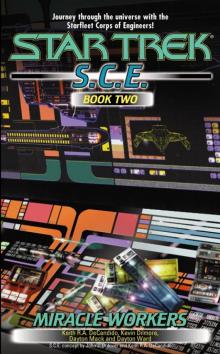 Miracle Workers
Miracle Workers Articles of the Federation
Articles of the Federation Supernatural Heart of the Dragon
Supernatural Heart of the Dragon War Stories: Book Two
War Stories: Book Two The Zoo Job
The Zoo Job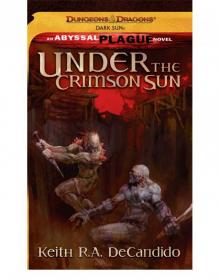 Under the Crimson Sun
Under the Crimson Sun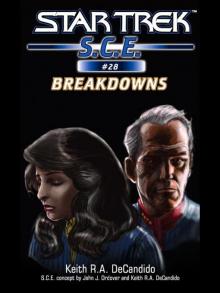 Breakdowns
Breakdowns Mermaid Precinct (ARC)
Mermaid Precinct (ARC) Supernatural 1 - Nevermore
Supernatural 1 - Nevermore STAR TREK - The Brave and the Bold Book One
STAR TREK - The Brave and the Bold Book One Four Walls
Four Walls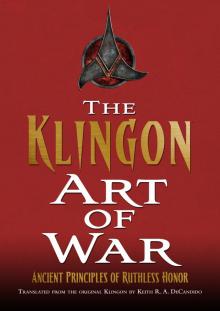 The Klingon Art of War
The Klingon Art of War Blackout
Blackout War Stories: Book One
War Stories: Book One The Brave and the Bold Book Two
The Brave and the Bold Book Two Honor Bound
Honor Bound Sleepy Hollow: Children of the Revolution
Sleepy Hollow: Children of the Revolution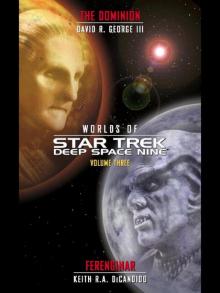 Worlds of Star Trek Deep Space Nine® Volume Three
Worlds of Star Trek Deep Space Nine® Volume Three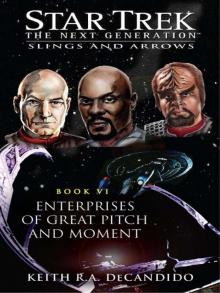 Star Trek: TNG: Enterprises of Great Pitch and Moment
Star Trek: TNG: Enterprises of Great Pitch and Moment Genesis
Genesis Demons of Air and Darkness
Demons of Air and Darkness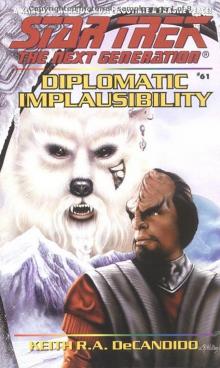 Star Trek - TNG - 61 - Diplomatic Implausibility
Star Trek - TNG - 61 - Diplomatic Implausibility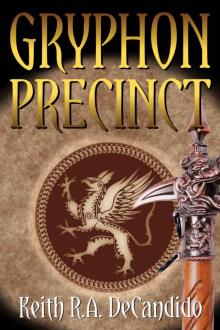 Gryphon Precinct (Dragon Precinct)
Gryphon Precinct (Dragon Precinct)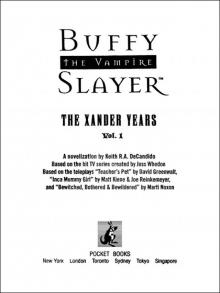 THE XANDER YEARS, Vol. 1
THE XANDER YEARS, Vol. 1 Nevermore
Nevermore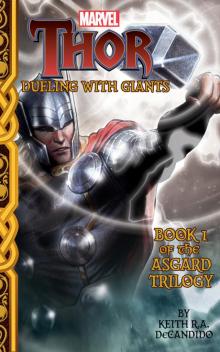 Thor
Thor The Brave And The Bold Book One
The Brave And The Bold Book One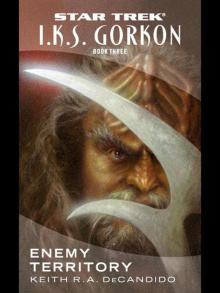 I.K.S. Gorkon Book Three
I.K.S. Gorkon Book Three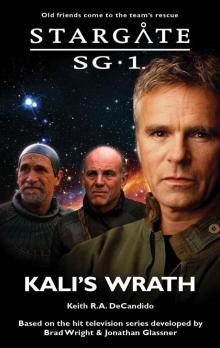 STARGATE SG-1: Kali's Wrath (SG1-28)
STARGATE SG-1: Kali's Wrath (SG1-28) Bone Key
Bone Key Guilt in Innocece
Guilt in Innocece Star Trek - DS9 Relaunch 04 - Gateways - 4 of 7 - Demons Of Air And Darkness
Star Trek - DS9 Relaunch 04 - Gateways - 4 of 7 - Demons Of Air And Darkness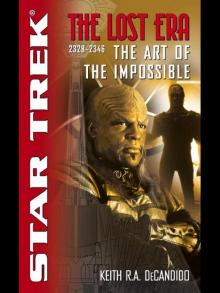 The Art of the Impossible
The Art of the Impossible I.K.S. Gorkon Book One: A Good Day to Die
I.K.S. Gorkon Book One: A Good Day to Die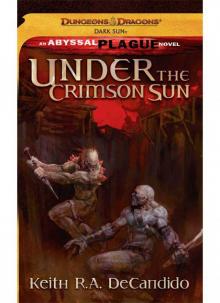 Under the Crimson Sun (the abyssal plague)
Under the Crimson Sun (the abyssal plague)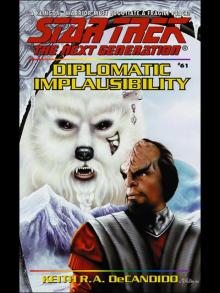 DIPLOMATIC IMPLAUSIBILITY
DIPLOMATIC IMPLAUSIBILITY Tales from the Captain's Table
Tales from the Captain's Table A Burning House
A Burning House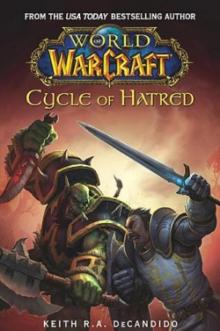 Cycle of Hatred (world of warcraft)
Cycle of Hatred (world of warcraft)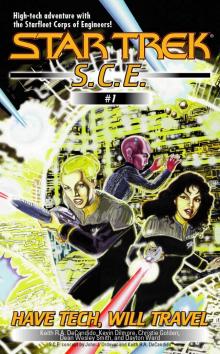 Have Tech, Will Travel
Have Tech, Will Travel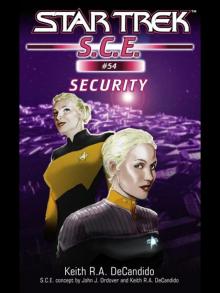 Security
Security